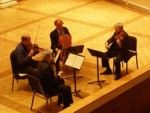Stringing the Crowd Along: MSQ Comes to Colgate

While the early weeks of October are perhaps best known on campus as the time for homecoming, music aficionados were given a different sort of treat last Friday as the Manhattan String Quartet (MSQ) performed their traditional fall concert. The MSQ has been the official quartet-in-residence of Colgate for the past 22 years, and in addition to giving lectures and demonstrations for music concentrators and CORE 152 students, they present a concert open to the public. This year the Quartet planned a completely 20th century program, featuring works of Shostakovich, Bartók and Ravel. I’ll admit right here at the start that I rarely find pleasure in listening to post-Romantic music, and the beginning of the concert seemed to confirm my fears. Fortunately, by the end of the night I changed my mind, as the grace and skill of the MSQ left me all but speechless.
My problem with late Romantic and contemporary music is primarily an emotional one. More often than not the composer, speaking in an incomprehensible language, fails to connect with the audience (I’ve seen more feeling conveyed in a still-life of fruit than in the opus of Toru Takemitsu). Performers may also give so uninspired a reading of a work, however, that listeners must resist the urge to entertain themselves by hurling ripe vegetables at the stage. In the case of Shostakovich’s “Quartet no. 9 in Eb,” I believe that neither the composer nor the performers were at their best. While I enjoy Shostakovich’s symphonies (there is quite a bit of humor lurking in the background of his “Soviet Realism” music), his string quartet was surprisingly boring; the treatment of the voices, especially the cello, did not let any of the instruments really shine. In addition, although the MSQ is renowned for having recorded Shostakovich’s entire string quartet cycle, there was a lack of energy and feeling in Friday’s rendition. Of course, the MSQ was technically proficient and segued from one movement to another with a beautiful fluidity, but the emotion was noticeably lacking.
Following the Shostakovich piece, I found my already low expectations falling faster than a viola tossed over the edge of a cliff. Happily the next work, Béla Bartók’s “Quartet no. 6” was significantly more impassioned and kept me riveted me to my seat. This quartet was the last piece of music Bartók wrote before fleeing Hungary for the United States in 1939; the sorrow contained within the music was almost overwhelming.
First of all, in a departure from tradition Bartók, called for a slow mesto melody before each of the quartet’s four movements. The first of these mesti, a viola solo that opened the Vivace, was absolutely astounding in its depth of emotion (I credit John Dexter for milking the solo for all it was worth). The second movement, an ironic Marcia, had all of the cynicism I would expect of a Shostakovich critique of Stalin; it presented a group of soldiers slinking back to town after a defeat. Instead of the typical gloria militar, this march suggested a whole different aspect of war. (Bartok must have written this while despondently watching as the clouds of war slowly gathered around his home country.) Likewise, the Burletta and Molto tranquillo each explored a range of emotions, but the mesto introduction before each reinforced the theme of sadness pervading the work as a whole. Here I must note that unlike in the Shostakovich, the performers were visibly moved and were more than able to imbue the music with their feelings.
During the ten-minute intermission following the Bartók piece, I had a chance to talk to the members of the MSQ and inquired as to why they chose a fully 20th-century program; my wording was something along the lines of “usually performers intersperse these more modern compositions with something a bit more palatable” (i.e. a frilly Mozart quartet). The response I got back was thought provoking and surprisingly polite given my question: Calvin Wiersma said the problem with my ideal concert program is that it makes people think that 20th-century music is somehow “wrong.” He continued to say that there was so much variation among the three works performed that night that the audience had more than enough occupying their minds to bother comparing modern with Classical or Romantic music.
That last point was made especially clear during the opening chords of the final piece: Ravel’s “Quartet in F.” In contrast to the other quartets, it was sickeningly French. It’s not that I dislike the French Impressionist school of music (well okay, I do, but that’s beside the point), but I realized soon after the Allegro moderato — tres doux began that I was likely in for half an hour of Impressionist mush that would end up going nowhere.
To my great surprise, though, the members of the MSQ were able to transform an average work into a truly interesting performance. Not only were the rhythms smooth and undulating, but the performers added beautiful contours to the musical lines (maybe if Ravel had had the MSQ playing for him back in 1903 this piece wouldn’t have lost the Prix de Rome competition). Although the work itself could not rival Bartók’s quartet in depth, at the end of the Ravel I was thoroughly convinced of the MSQ’s talent (and apparently so was the audience: the Quartet received a standing ovation).
At the end of the day, while their choice of music was a bit daring (at least to people as old-fashioned as myself) it was clear that the Manhattan String Quartet deserves its title as one of the preeminent quartets in the country. Combining excellent musicianship with convincing emotion, the MSQ presented a very moving concert and ended up being one of the highlights of my homecoming weekend.






